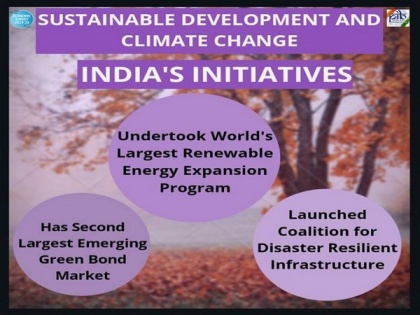India striving to combine sustainability and economic development: Economic Survey
By ANI | Published: January 31, 2020 09:50 PM2020-01-31T21:50:57+5:302020-01-31T23:01:06+5:30
Emphasising the idea that wealth creation should do no harm, the Economic Survey tabled in Parliament on Thursday highlights several ideas on the themes of Sustainable Development and Climate Change.

India striving to combine sustainability and economic development: Economic Survey
Emphasising the idea that wealth creation should do no harm, the Economic Survey tabled in Parliament on Thursday highlights several ideas on the themes of Sustainable Development and Climate Change.
The survey affirms that the Sustainable Development Goals (SDGs) constitute a befitting framework to answer the developmental challenges to achieve a sustainable future, free from social, economic, and environmental inequalities and ensuring a greener and healthy planet for future generations.
As per the survey, India is striving to combine the element of 'sustainability' to its economic development through well-designed initiatives for inclusive development enshrined in its policies like electrification of rural households, augmenting usage of renewable sources, eliminating malnutrition, eradicating poverty, increasing access to primary education to all girls, providing station and housing for all, equipping young people with skills to compete in the global labour market, enabling access to finance and financial services.
The survey underscores that India has achieved considerable progress in the field of SDGs as measured by the SDG India Index 2019.
As per the SDG Index, Kerala, Himachal Pradesh, Tamil Nadu, Andhra Pradesh, Telangana, Karnataka, Goa, Sikkim, Chandigarh and Puducherry are the front- runners.
The composite score for India in the index has improved from 57 in 2018 to 60 in 2019, indicating the impressive progress made by the country in its journey towards achieving the SDGs.
The survey highlights that there are linkages among various SDGs and these have strong impacts on the reinforcement of policies.
This necessitates a 'nexus' approach which in turn employs the principles of integrating management and governance across sectors and scales.
As per the survey, this envisages looking at systems instead of individual components or short-term outcomes, looking at the inter-related feedbacks from other sectors and promoting cooperation among sectors while reducing competition for scarce resources.
The survey recognizes the fact that the open burning of crop residues in the agricultural fields has become a major environmental concern.
It emphasizes that agricultural residue burning contributes significantly in PM2.5 concentrations.
The effect of stagnant atmospheric condition over Delhi during the harvest season of Kharif crop further aggravates the deterioration of the ambient air quality over the region.
The survey suggests various methods to address this issue which include promoting the practice of conservation of agriculture with low lignocellulosic crop residues like rice, wheat, maize, role of agricultural machineries in helping farmers sow the seeds for the next season and creating a market for crop residue-based briquettes.
( With inputs from ANI )
Open in app